Angie Brown,Edinburgh and east reporter
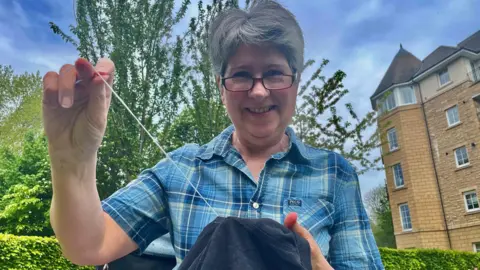 bbc
bbcMary Morton goes out into the parks and streets of Edinburgh to repair the clothes of passers-by for free.
The 67-year-old fixes, mends and shows people how to breathe new life into their tired garments – and has built an army of volunteer street stitchers who work across the city.
The former pharmacist, who has not bought clothes for five years, says she decided to change her lifestyle after becoming concerned about the impact of textiles on the environment.
She sits outside with a banner over the back of her chair that says “stitch it, don’t ditch it” while sewing – and she waits for people to ask her what she is doing.
Mary says she recently helped sew a button onto a woman’s shirt while she was standing chatting, while another couple sat down on a path in Princes Street Gardens and started mending what they were wearing.
“They were from Sweden and they said they were going to go back home and start up in a group – and they did.”
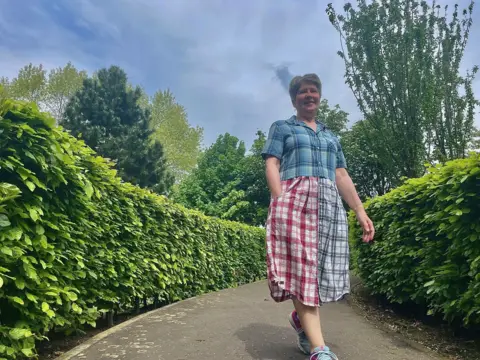 bbc
bbcThe grandmother-of-two believes that once people have the basic skills they will be able to repair three quarters of their wardrobe.
She says passers-by are directed to individual street stitchers depending on what they need fixed. They are also encouraged to return with clothing they want to be fixed.
“Because there are so many of us now we all have different strengths,” says Mary.
“For example, one of the group, Helena, is very good with darning, needle felting and knitwear-type repairs so we would direct them to her if they have something like that.
“My thing is I’m keen on hand sewing, denim repairs and Sashiko.
“People are very interested in what we are doing. A lot of people say they can’t sew but they very much want to be able to, so they are often very grateful to be pointed in the right direction to learn.
“And what often surprises people is just how easy it is to talk them through a small repair.”
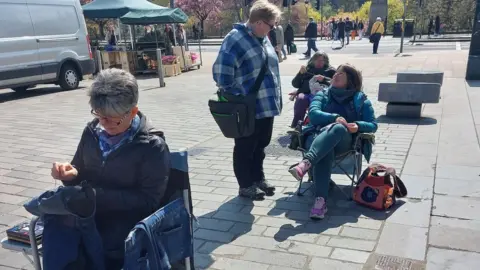 Mary Morton
Mary MortonMary started her group of street stitchers two years ago after taking some online courses on the environment.
At the time she wanted to learn more about what was behind her son’s job as a renewable energy engineer.
She said: “Hearing about the huge carbon impact of textiles shocked me and I knew immediately I wanted to do my bit to reduce it.”
According to the European Parliament, the fashion industry is estimated to be responsible for 10% of global carbon emissions, which is more than international flights and maritime shipping combined.
Mary got her idea from Suzi Warren, who started the street stitching movement in London.
“She usually goes outside big clothing stores to raise awareness to the fact clothes can be repaired instead of people just buying fast fashion all the time and chucking it out,” she says.
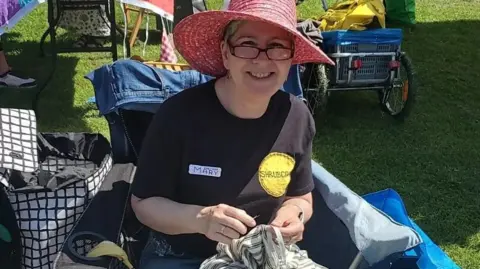 Mary Morton
Mary MortonMary said she had taken a slightly different approach in Edinburgh, where they thought the important thing was to enable people to repair things.
“We encourage people to bring something they want to repair by putting up some information before we set up in that area.
“We also signpost people to local things where they can learn how to sew.”
Mary has changed to a plant-based diet, sold her car, travels by bike, bus or train, and only buys clothes from second hand shops.
She said she had made a lot of changes in her own life because of the climate situation – but wanted to do more.
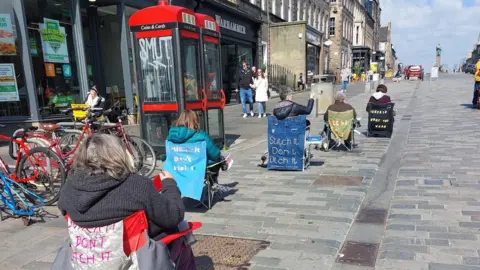 Mary Morton
Mary MortonNow she runs her army of street stitchers for Edinburgh’s Zero Waste Hub charity, which is funded by the National Lottery Community Fund.
“I thought what is my skill base? Then I realised sewing is a thing a lot of young people can’t do now because they don’t seem to get it in schools the same way we did,” said Mary.
“Obviously I could repair people’s clothes for them but that has a limited reach.
“To teach someone to repair their own is better because then for the rest of their lives they are repairing and therefore this has a much bigger impact.”
This post was originally published on this site be sure to check out more of their content.









